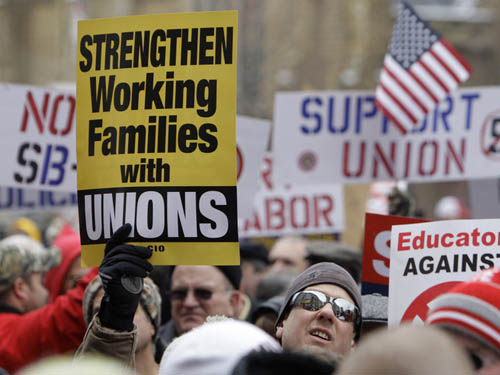
Photo by Jay LaPrete/AP
July 30, 2011
While vacationing in Charleston, South Carolina earlier this year, the local media were full of editorials complaining about the April 20, 2011, complaint issued by the National Labor Relations Board against Boeing Company, alleging Boeing’s decision to assemble large commercial aircraft at a new final assembly plant in South Carolina violated the National Labor Relations Act. The complaint alleges Boeing illegally “transferred” work from its unionized assembly plant in Seattle, Washington to the new South Carolina facility.
South Carolina is a right-to-work (RTW) state whereas Washington state is a non-RTW state. I am sure that Boeing took this into consideration when it relocated to South Carolina. The 1947 Taft-Hartley amendments to the Labor Management Relations Act, 29 U.S.C §14(b) permits a state to pass laws that prohibit unions from requiring a worker to pay dues, even when the worker is covered by a union-negotiated collective bargaining agreement. Thus, workers in RTW states have less incentive to join a union and to pay union dues and, as a result, unions have less clout vis-à-vis corporations. Today, 22 states have RTW laws. These states are located predominantly in the South and Southwest.
Proponents of RTW laws claim that economies with such laws grow faster and their citizens are better off. But with their faster growing populations, RTW states had unemployment rates averaging 8 percent in April of this year, just below the 8.2 percent average in non-RTW states.
In The Compensation Penalty of “Right-To-Work” Laws (February 17, 2011 Economic Policy Institute Briefing Paper #299), economists Elise Gould and Heidi Shierholz examined the differences in compensation between RTW and non-RTW states. Controlling for the demographic and job characteristics of workers, as well as state-level economic conditions and cost-of-living differences across states, they found that wages in 2009 were 3.2 percent lower in RTW states versus non-RTW – about $1,500 less annually for a full-time, year-round worker; the rate of employer-sponsored health insurance was 2.6 percentage points lower in RTW states compared with non-RTW states; the rate of employer-sponsored pensions was 4.8 percentage points lower in RTW states. And, in 2008, the rate of workplace deaths was 57 percent higher in RTW states than non-RTW states, while the 2009 poverty rate in RTW states averaged 15 percent, considerably above the 12.8 percent average for non-RTW states.
Gould and Shierholz concluded, “RTW legislation misleadingly sounds like a positive change in this weak economy, in reality the opportunity it gives workers is only that to work for lower wages and fewer benefits. For legislators dedicated to making policy on the basis of economic fact rather than ideological passion, our findings indicate that, contrary to the rhetoric of RTW proponents, the data show that workers in “right-to-work” states have lower compensation – both union and nonunion workers alike.”
Why do we need unions anyway? Because they are essential for America. Unions are the only large-scale movement left in America that persistently acts as a countervailing balance against corporate power. They act in the economic interests of the middle, working class. But the decline of unions over the past few decades has left corporations and the rich with essentially no powerful opposition. You may take issue with a particular union’s position on an issue, but remember they are the only real organized check on the power of the business community in this country. RTW laws are anti-union, pro-business
It is not surprising that RTW states generally vote Republican while the Democratic Party receives significant support from organized labor, who supply a great deal of the money, grass roots political organization, and voting base in support of the party.
RTW laws then are really “right-to-work-for-less” laws, as union critics call them. They are great for business, but not so great for the workers and the economies of RTW states.


 The Hunger Site
The Hunger Site
August 1, 2011 at 7:19 pm
Haven’t the Chinese workers and illegal immigrants done the same thing?
August 1, 2011 at 3:00 pm
My article really isn’t about NLRB v. Boeing. It is about RTW v. non-RTW states and the undermining of unions in America.
August 1, 2011 at 12:01 pm
How many union workers would be laid off as a result of opening of the shop in South Carolina? If the answer is none, then I have no problem with Boeing. Better to add jobs in the USA, rather than in China. The decline of jobs in the USA is more worrysome than jobs going oversees, or to illegal immigrants who send their cash out of the country and don’t fully contribute in income, SSN and medicare taxes.